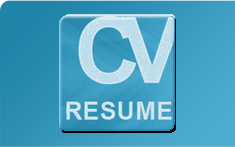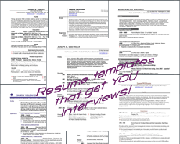
Resume format
How to make a CV-Resume
Resume cover letter
Personal Branding
CV-Resume: resume format
¿Are you trying to make a resume, that impress your potential employer? ¿Looking for the best job resume format? ¿You are not sure which one is better for you? In order to make a good resume there are some tips and advice that you should follow so that you stand the best chances of impressing your potential employer. Deciding which format is best suited to the job you are applying for is important and in this section you can find some resume examples that will help you decide on the one that is best for you.
When it comes to writing a CV Resume we all start with the same question - how do I write it? We often search the internet, finding many different results that only help to confuse us even further. With so many people having a different opinion about what they belief makes a good CV Resume, we can often end up finding samples upon samples, using various types of formats and including a range of different information.
In the end, it can feel like we have done nothing more than waste valuable time searching for how to write the perfect CV Resume - as we still can't answer the question. This can be one of the worst things to happen, as what we do next may be one of the worst crimes we can commit. Stuck for a way to write our CV Resume we end up going with the first type of CV Resume format we can find. However this could be the wrong type of format and as a result we could have lost out on a job opportunity.
This is exactly what we don't want to happen to you. We want to help you to make the best CV Resume – without any mistakes - so that you can land a job interview. As you may know, an excellent CV Resume doesn't mean that you will get the job, but it does help when it comes to the moment of choosing the correct candidates for the interview stage. Having all the right elements to your CV Resume will really help. How it looks is important so that you can make sure you make it on to the shortlist for interviewees. Remember that lots of people could be applying for the same job so treat your CV Resume as your marketing tool and make sure it looks as professional as it can. Below are some of the different job resume format examples that we have selected for you, according to the requirements of the employers and the knowledge we have built up after years of doing what we do best: helping people to get interviews.
In this section you will find different types of CV Resume such as: chronological resume, functional resume, combined resume and also some information on the personal data that you should include in your CV Resume.
This type of CV Resume is commonly used because it's one of the simplest ways of letting your potential employer know about all your previous work experience and the responsibilities you had in each of those jobs. This type of CV Resume shows a potential employer that you are experienced in the field, and is best to use if your previous jobs have had impressive titles, as this is what will stand out to the employer.
This type of job resume format is focused on highlighting your skills and qualifications. This way the employer can see what your strong points are, when considering you against the other applicants.
This type of format can be particularly useful for graduate students looking for jobs. It is also useful if, for whatever reason, you have had gaps in your employment or have changed your job frequently.
Dedicating the time to making this type of resume could appear to be a waste, but it has some benefits which can be very useful when it comes to the interview because the employer can focus on your strong points.
As the name suggests it is a mix between the functional and chronological format. It gives your potential employer a summary of your career, as well as a brief summary of your education and details of the skills you have acquired.
As we have seen until now, resumes are the pivotal point when it comes to getting an interview with our potential employer. Should an employer decide to get back to you about an interview then you need to make sure that your personal data is correct and clearly written. A wrong email or phone number could turn out to be your worst mistake.
Make sure that your CV Resume includes your name, date of birth, address, contact number and e-mail. This way you can guarantee that a potential employer will be able to get in contact with you, should your application be a success. This is the most important information that you need to include. Adding irrelevant information to this section will only work against you, so only include the essentials.
